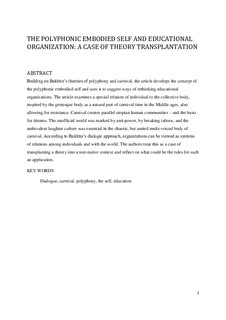The Polyphonic Embodied Self and Educational Organization: A Case of Theory Transplantation
Journal article, Peer reviewed
Accepted version
Permanent lenke
http://hdl.handle.net/11250/2590709Utgivelsesdato
2018-10Metadata
Vis full innførselSamlinger
- Artikler (Articles) [173]
- Publikasjoner fra Cristin - DMMH [138]
Originalversjon
Moe, M., Sidorkin, A.M. (2018).The Polyphonic Embodied Self and Educational Organization: A Case of Theory Transplantation. Interchange, 1-13. 10.1007/s10780-018-9343-4Sammendrag
Building on Bakhtin’s theories of polyphony and carnival, the article develops the concept of the polyphonic embodied self and uses it to suggest ways of rethinking educational organizations. The article examines a special relation of individual to the collective body, inspired by the grotesque body as a natural part of carnival time in the Middle ages, also allowing for resistance. Carnival creates parallel utopian human communities – and the basis for dreams. The unofficial world was marked by anti-power, by breaking taboos, and the ambivalent laughter culture was essential in the chaotic, but united multi-voiced body of carnival. According to Bakhtin’s dialogic approach, organizations can be viewed as systems of relations among individuals and with the world. The authors treat this as a case of transplanting a theory into a non-native context and reflect on what could be the rules for such an application.
